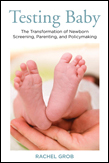Book examines implications of newborn screening
A new book from Rachel Grob, a visiting professor at the University of Wisconsin Law School, is the first to explore the sociological implications of a program that tests newborns for genetic diseases.

Grob, scholar in residence and director of national initiatives at the Center for Patient Partnerships at the UW–Madison, interviewed parents and newborn screening administrators for “Testing Baby: The Transformation of Newborn Screening, Parenting, and Policymaking,” published this fall by Rutgers University Press.
Grob notes that newborn screening has a long history in Wisconsin, and that its implications have long been of interest to a number of researchers associated with the university.
Within 48 hours after birth, Grob says, the heel of every baby in the United States has been pricked and the blood sent for compulsory screening to detect or rule out a large number of disorders. Newborn screening is expanding rapidly, fueled by the prospect of saving lives. Yet many lives are also changed by it in ways not yet recognized. Grob’s new book draws on parents’ experiences with newborn screening in order to examine its far-reaching sociological consequences.
“Testing Baby” is a cautionary tale, she emphasizes, that also “explores the powerful ways that parents’ narratives have shaped this emotionally charged policy arena. Newborn screening occurs almost always without parents’ consent and often without their knowledge or understanding, yet it has the power to alter such things as family dynamics at the household level, the context of parenting, the way we manage disease identity, and how parents’ interests are understood and solicited in policy debates.”
Grob, who is also a health advocacy faculty member at Sarah Lawrence College, has also recently co-edited a book called “Patients As Policy Actors” that documents the many ways patients participate in the policy process – a topic she continues to research and explore at UW–Madison.
Tags: health & medicine, Law School




